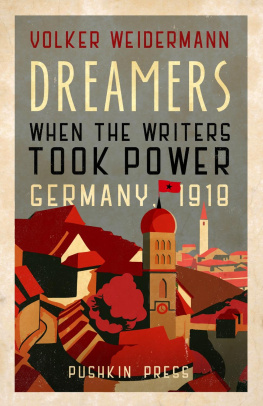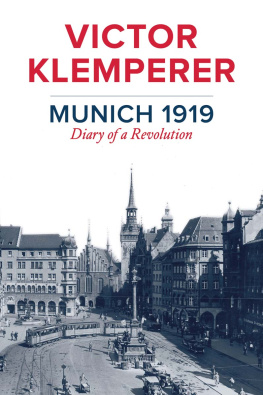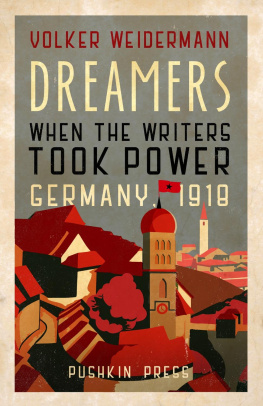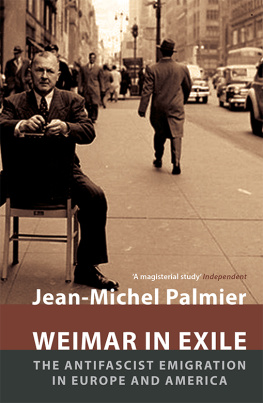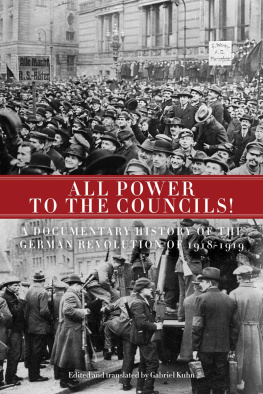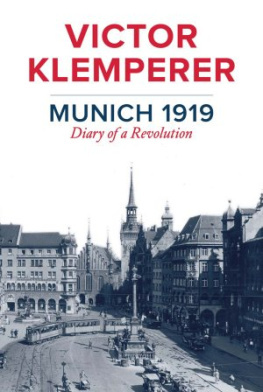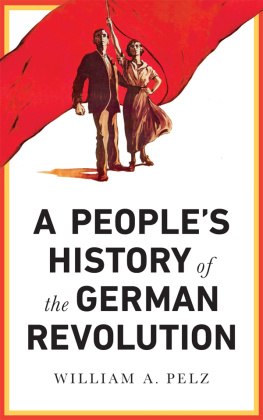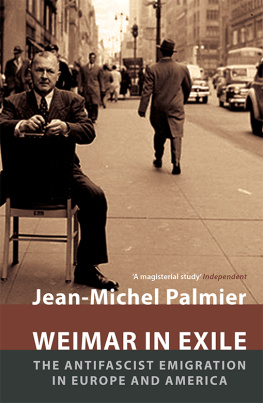IT HAD BEEN A FAIRY TALE , of coursenothing but a fairy tale that had become reality for a few weeks. And now it was over. It would have been ridiculous to cling to power any longer: the election results in January had been too devastating for that. Two per cent, it was a joke, a cruel, bad joke. Ever since, the press had been subjecting him not only to more of their frenzied hatred, but to mockery and scorn as well. A peoples king without a people, a jester on the kings throne, un-Bavarian crackpot, Jewish upstart.
Kurt Eisner had given up. His negotiations with his archenemy Erhard Auer, the leader of the Social Democrats, had gone on late into the night. Negotiations was hardly the right word. He had nothing left to bargain with. Auer had offered him the position of Ambassador to Prague; he might as well have said Consular Secretary to Australia. It was over. Hed had his chance and done what he could to transform the Kingdom of Bavaria into a peoples republic, a land of solidarity and altruism.
It was a dream, to suddenly find himself sitting in the prime ministers seat on the night of 7th November. Sometimes you just had to be quick-witted enough to recognize the moment when it arrived. And it arrived on 7th November 1918.
A sunny afternoon; tens of thousands of soldiers, sailors, unionists and workers had gathered on the western slope of the Theresienwiese. The mood was tense. The Minister of the Interior, von Brettreich, had had the city plastered with posters announcing that order would be maintained. The Social Democratic Partys Erhard Auer had given him his personal assurance of that the previous day. A revolution was not about to break out. Kurt Eisner, parliamentary candidate for the Independent Social Democrats, who had been invoking the coming revolution for days, would be forced to the wall, that was how Auer had put it. He said he had the situation in hand.
He didnt have anything in hand. There was chaos that afternoon: more and more people arriving; soldiers streaming in from the barracks, most of them having torn off their insignia. The menand a few womenstood in little groups, clustering first around one speaker, then another. Auer had secured the best position for himself, on the grand steps leading up to the statue of Bavaria. But when the crowds realized he was just trying to placate them, promising them jam in some far-off tomorrow, they moved on to the other speakers further down the slope.
Kurt Eisner was standing right at the bottom. He was almost yelling, waving his arms in the air. A crowd was forming around the man with the long grey hair, the pince-nez, the wild beard and the large hat. He had a good name among those who were hoping for revolution: he had organized the munition workers strike in January, had spent six months in prison for it.
His speaking style was not particularly rousing; his voice was scratchy and high-pitched. He had some trouble making himself heard above the other speakers. But the crowd sensed that, today, this was their man. He wasnt going to send them home. He could feel the energy of the day, the rage, the will for some decisive thing to happen at last. The king had been seen that morning taking a stroll through the English Garden. Well, how much longer did he want to go on strolling? How much longer did he want to rule?
A young radical pacifist in a black coata coarse-featured bakers son from the town of Berg on Lake Starnberg, who works in a Munich biscuit factory and has been a successful black-marketeer for a few weeks now, who has written poetry and literary criticism for the Mnchner Neueste Nachrichtenis also standing spellbound, listening to Eisner. It is Oskar Maria Graf. Hes there with his friend, the artist Georg Schrimpf, who painted the cover picture for Grafs first poetry collection, The Revolutionaries. It contained a short verse called Adage:
Sometimes we must be murderers;
Humility has only defiled us all,
And time passed us by, mantled in too much weariness.
Hard-knocked, bowed by drudgery
Fates mercenary grits his teeth
And blindly hurls himself into the teeming flood
He will be purified
And rise again a raw, sleepless penitent,
Knowing his final mission
For almost two years, the pair attended the pre-revolutionary Monday meetings at the Golden Anchor tavern in Ludwigsvorstadt, where Kurt Eisner was a regular speaker. Thats where they know him from, albeit at a distance. Good God, the whole of Munich is here, says Graf. This is a real opportunity! I hope they dont just go home again today without taking some action. A bearded, uniformed giant hears and flashes him a supercilious smile. Oh no, we aint goin home today Goin somewhere else today Any minute now.
At that moment the people around them start shouting Peace! and Long live the world revolution! and Long live Eisner! Then silence descends for a minute and from further up the hill, from Bavaria, where the conciliatory Auer is speaking, the sound of cheering reaches them. Eisners close friend Felix Fechenbach, a twenty-five-year-old writer with a doughy face and a sparse beard, calls out to the throng: Comrades! Our leader Kurt Eisner has spoken! Theres no sense in wasting any more words! If youre for the revolution, follow us! Follow me! March!
The crowd surges forward as one, up the slope, heading for the Westend. On they go, past shops with their shutters pulled down, on towards the barracks. Graf and his friend Georg, whom everyone calls Schorsch, are marching almost at the head of the column, just five paces away from Eisner. Graf will later say of the man who has suddenly become their leader: He was pale and his expression deadly serious; he didnt speak a word. It almost looked as if the sudden turn of events had taken him by surprise. Now and then he would stare straight ahead, half fearful and half distracted. He was walking arm in arm with the broad-shouldered, blind peasant leader Gandorfer, who strode along purposefully. His movements were much freer, he was heavy-footed and solid, and walked just as youd imagine a Bavarian peasant might. The two of them were surrounded by a vanguard of loyal followers.
There are more and more of them. The police have fallen back, windows are opening, people looking out, silent, curious. The first armed men join the march, the mood is bright, as if theyre going to a festival. Someone tells them the seamen have taken the Residence, there is an effervescent cheer, the excitement grows.
Where are they marching to? Their pale, determined leader seems to be following a schedule. They head resolutely further out of the city. Eventually the crowd plunges down a dark alley. Halt! comes the cry from the front. Where are they now? A school?
Its the Guldein School, which for the past few years has been used as a war barracks. The first shot is fired, people are on the edge of panic, some rush into the school, most push their way back out. Before long a window on the top floor of the school building is thrown open, and someone waves a red flag and shouts: The men are for the revolution! Theyve all come over! Onward! March! March on!
That is the moment. From then on, everything seems to happen of its own accord. More and more soldiers join them, they have torn the epaulettes from their shoulders, tied scraps of red cloth to their uniforms, a new community is forming. Children walk alongside the crowd, cheering. At one point they meet a soldier coming the other way, a paymaster, still wearing his insignia. They rip off his epaulettes, shove him from one person to the next. A giant of a man wants to lay hands on him. The soldier starts to weep and the brawny Oskar Maria Graf steps in: Let him go! Come on, its not his fault! It takes some effort to placate the giant, who eventually mutters that Graf is right, but then also says: Mind though, cant afford to be too kind!

